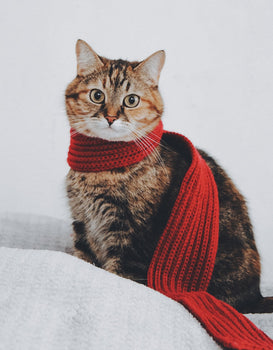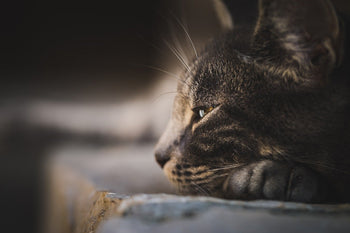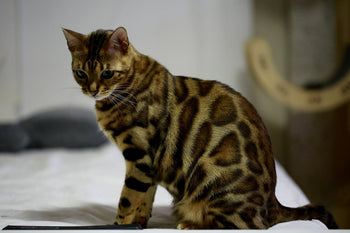Excessive drooling is a common issue among cats, and it can be caused by a variety of factors. While it's normal for cats to drool occasionally, excessive drooling can be a sign of an underlying health condition. If your cat is drooling excessively but acting normally, it's important to understand the possible reasons behind this behavior.
One possible reason for excessive cat drooling is dental problems. Cats can develop dental issues such as gum disease, tooth decay, or abscesses that can cause them to drool excessively. Another possible cause is nausea, which can be caused by a variety of factors such as gastrointestinal issues or motion sickness. In some cases, excessive drooling can also be a sign of a more serious condition such as liver or kidney disease.
If your cat is drooling excessively but is still acting normally, it's important to monitor their behavior closely and seek veterinary assistance if necessary. While some cases of excessive drooling may not be serious, others may require immediate medical attention. By understanding the possible reasons behind this behavior, you can help ensure that your cat stays healthy and happy.
Cat drooling excessively but acting normal
Key Takeaways
Excessive drooling in cats can be caused by a variety of factors, including dental problems, nausea, and underlying health conditions.
If your cat is drooling excessively but acting normally, it's important to monitor their behavior closely and seek veterinary assistance if necessary.
By understanding the possible reasons behind excessive drooling, you can help ensure that your cat stays healthy and happy.

Understanding Excessive Cat Drooling
Definition and Description
Drooling is a normal behavior in cats, but excessive drooling can be a sign of an underlying health issue. Excessive drooling, also known as hypersalivation, is when a cat produces an excessive amount of saliva that drips from their mouth. It can be difficult to determine the cause of excessive drooling in cats, but it is important to monitor the behavior and seek veterinary attention if it persists.
Potential Causes
There are several potential causes of excessive drooling in cats. Some of the most common causes include dental issues, nausea, and heat stroke. Other potential causes include:
Oral infections
Foreign objects stuck in the mouth
Poisoning
Allergic reactions
Neurological issues
It is important to note that excessive drooling can also be a side effect of certain medications, so it is important to consult with a veterinarian if a cat is on medication and experiencing excessive drooling.
Benign Drooling
While excessive drooling can be a sign of an underlying health issue, some cats may drool excessively for benign reasons. For example, some cats may drool when they are happy or content, or when they are being petted. Additionally, some breeds of cats, such as Persians, may naturally produce more saliva than other breeds.
In conclusion, excessive drooling in cats can be a sign of an underlying health issue or a benign behavior. It is important to monitor the behavior and seek veterinary attention if it persists or if there are other concerning symptoms present.
Possible Reasons for Excessive Drooling
Excessive drooling in cats can be a cause for concern for many pet owners. While drooling is a normal behavior in cats, excessive drooling can indicate an underlying health issue. Here are some possible reasons for excessive drooling in cats:
Dental Problems
Dental problems are one of the most common reasons for excessive drooling in cats. Cats can suffer from dental issues such as periodontal disease, tooth decay, and oral tumors, which can cause pain and discomfort. This can result in excessive drooling, as the cat tries to alleviate the discomfort.
Medication Effects
Certain medications can cause excessive drooling in cats. For example, chemotherapy drugs can cause drooling due to their effects on the digestive system. Additionally, some medications can cause hypersalivation, which can result in excessive drooling.
Other Causes
Other causes of excessive drooling in cats include nausea, motion sickness, and heatstroke. Cats may also drool excessively due to stress or anxiety.
If your cat is drooling excessively, it is important to seek veterinary care immediately. A veterinarian can diagnose the underlying cause of the drooling and provide appropriate treatment.
Related Posts:

When to Seek Veterinary Assistance
If a cat is drooling excessively but acting normal, it may not necessarily be a cause for alarm. However, there are certain situations where it is important to seek veterinary assistance. This section outlines some guidelines to help cat owners determine when to seek veterinary assistance.
Guidelines for Consultation
If a cat is drooling excessively for an extended period of time, it is recommended to seek veterinary assistance. Additionally, if the drooling is accompanied by other symptoms such as vomiting, lethargy, or loss of appetite, it is important to consult with a veterinarian.
Accompanying Symptoms
If a cat is drooling excessively and has accompanying symptoms such as difficulty breathing, coughing, or gagging, it is important to seek veterinary assistance immediately. These symptoms may indicate a more serious underlying condition such as a respiratory infection or obstruction.
Importance of Regular Check-Ups
Regular check-ups with a veterinarian are important for maintaining a cat's overall health. During these check-ups, a veterinarian can assess a cat's oral health and detect any potential issues such as dental disease or oral tumors. Regular check-ups can also help detect any underlying conditions that may be causing excessive drooling.
In conclusion, excessive drooling in cats may not always be a cause for alarm, but it is important to be aware of accompanying symptoms and to seek veterinary assistance if necessary. Regular check-ups with a veterinarian can also help maintain a cat's overall health and detect any potential issues.
Conclusion
In conclusion, excessive drooling in cats can be a cause for concern for many pet owners. However, it is important to note that drooling alone does not necessarily indicate a serious underlying health issue.
If a cat is drooling excessively but otherwise behaving normally, it may be due to a variety of reasons such as excitement, stress, or even a change in diet. In some cases, drooling may also be a side effect of medication.
Pet owners should monitor their cat's behavior and look for any other symptoms that may indicate a more serious health issue. If the drooling persists or is accompanied by other symptoms such as vomiting or lethargy, it is important to seek veterinary care.
Overall, it is important for pet owners to be aware of their cat's behavior and seek veterinary care if they have any concerns. By being proactive and seeking medical attention when necessary, pet owners can help ensure the health and well-being of their furry companions.

Frequently Asked Questions
What could be causing my cat to drool so much all of a sudden?
Excessive drooling in cats can be caused by a variety of factors such as dental problems, mouth ulcers, or foreign objects stuck in the mouth. It could also be a sign of an underlying health issue such as kidney disease, liver problems, or respiratory issues. If you notice sudden and excessive drooling in your cat, it is best to consult with a veterinarian to determine the underlying cause.
How can I determine if my cat's excessive drooling is a sign of a serious health issue?
If your cat is drooling excessively and also exhibiting other symptoms such as vomiting, diarrhea, lethargy, or loss of appetite, it could be a sign of a serious health issue. It is best to take your cat to a veterinarian for a thorough examination and diagnosis.
Are there any common treatments for a cat that is drooling excessively?
The treatment for excessive drooling in cats depends on the underlying cause. For example, if the drooling is due to dental problems, your veterinarian may recommend a dental cleaning or extraction. If it is due to an infection, antibiotics may be prescribed. It is important to follow your veterinarian's advice and treatment plan for your cat's specific condition.
Could kidney failure be the reason behind my cat's sudden drooling?
Yes, kidney failure can cause excessive drooling in cats. Other symptoms of kidney failure include increased thirst and urination, weight loss, and lethargy. If you suspect your cat has kidney failure, it is important to take them to a veterinarian immediately for diagnosis and treatment.
What should I do if my cat is drooling a lot but still eating and behaving normally?
If your cat is drooling excessively but is still eating and behaving normally, it is still important to have them examined by a veterinarian. While it may not be an emergency, it could still be a sign of an underlying health issue that needs to be addressed.
Is excessive drooling a sign that my cat is nearing end-of-life, and how can I tell?
Excessive drooling is not necessarily a sign that your cat is nearing the end of their life. However, if your cat is exhibiting other symptoms such as difficulty breathing, decreased appetite, or lethargy, it could be a sign that they are nearing the end of their life. It is best to consult with a veterinarian for guidance on end-of-life care for your cat.
Related Posts:















